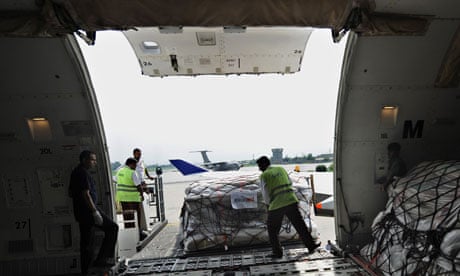The controversy over the leaked G8 report measuring progress against 2005 aid commitments demonstrates yet again the need for greater aid transparency.
The numbers used by the G8 to measure spending on development do not match other assessments, including those by the Organisation for Economic Co-operation and Development (OECD). Aid campaigners such as Oxfam have suggested the G8 is trying to hide its failure to stick to commitments.
Lack of aid transparency means we are wasting time and energy arguing about what has and hasn't happened. Energy that should be spent on the shared goal of getting the most out of aid in the fight against poverty and social injustice.
Increased aid transparency is key to making the best of aid spending. It creates a vital mechanism for taxpayers, citizens, journalists, NGOs and donors themselves to increase efficiency and reduce waste and corruption. When information is comparable and accessible, aid transparency helps citizens to follow the money – from the donor down to the textbooks, medicines and miles of road built.
Citizens of developing countries want a picture of how much aid their governments are receiving, and whether that aid is fuelling development or corruption. A recent analysis of 95 countries found that greater transparency among donors leads to lower corruption levels in partner countries.
In Liberia, perhaps the most highly aid-dependent country in the world, it is estimated that there is more than double the amount of aid being spent than is reported to the government. That makes Liberian citizens' own budget transparency and accountability efforts at best somewhat meaningless, and at worst impossible.
G8 governments and other aid donors claim to be committed to transparency and accountability, but their claims would sound less like rhetoric if they signed up to and implemented the International Aid Transparency Initiative (Iati).
Launched in 2008, and now signed by 19 donors covering over 50% of global aid flows, Iati proves a common standard for defining and disclosing aid information that make it easier to compare aid budgets and projects.
More than two years on, the handful of donors who have published their plans have shown that aid transparency can be achieved. Sadly, the majority are not on track. Only seven of the original 18 Iati signatories have published their implementation plans, and only three signatories – the Hewlett Foundation, the UK and the World Bank – have actually begun publishing their data using the Iati standard.
Where the other 15 Iati signatories stand is a mixture of too-slow progress and stalled promises. Germany, Ireland and Switzerland did not even submit their rollout plans. Key G8 donors Canada, France and Japan, have not signed up yet. Crucial to the long-term success of Iati will be including newer actors such as Brazil, China and Saudi Arabia, ideally before the big aid-effectiveness meeting in Korea in November.
Aid transparency means making aid information comprehensive, comparable, timely and accessible. This is a perfectly achievable goal and something that is within donors' power to implement this year, as those who have published their information have demonstrated. Iati provides the format and the tools for better aid. There is no excuse for donors not to act now.

Comments (…)
Sign in or create your Guardian account to join the discussion